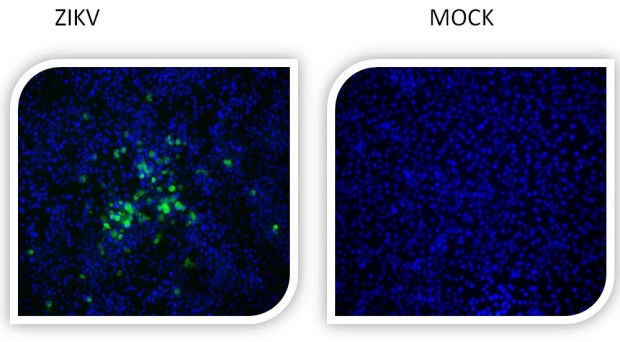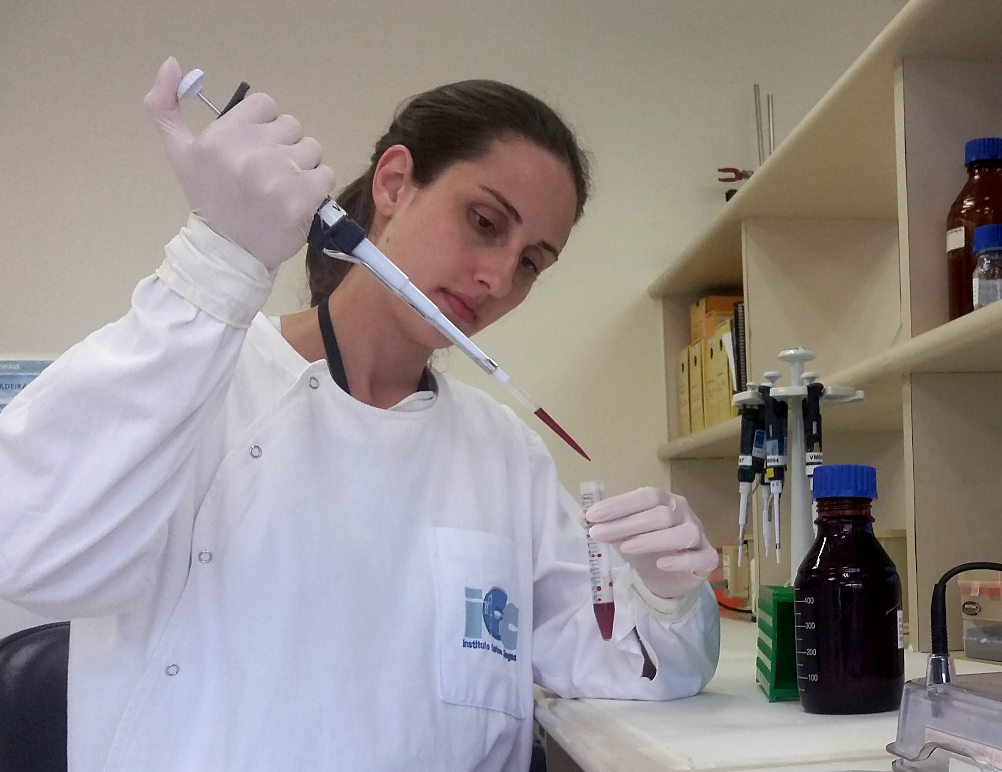
Dr Claudia Nunes Duarte dos Santos is vice-director for research, reference and collections at the Instituto Carlos Chagas in Curitiba, in the state of Paraná, Brazil.
 Instituto Carlos Chagas is an infectious diseases research institute and part of Fundação Oswaldo Cruz (Fiocruz), a large multi-center public health institution, which seeks to combat public health problems through basic and applied research, patient services, teaching and education.
Instituto Carlos Chagas is an infectious diseases research institute and part of Fundação Oswaldo Cruz (Fiocruz), a large multi-center public health institution, which seeks to combat public health problems through basic and applied research, patient services, teaching and education.
Her lab carries out research on dengue, hanta and arena viruses, as well as the emerging Zika virus (ZIKV). She is coordinator of the Sentinel Laboratory for Zika virus diagnosis for the Brazilian Ministry of Health and as such is responsible for confirming cases of the virus. Her lab was the first to isolate ZIKV in the region.
Your lab isolated the first case of Zika virus in Brazil in 2015. How did you identify the virus and how did it get to Brazil?
We identified the ZIKV RNA in clinical samples from the northeast of Brazil. My colleague, Dr Kleber Luz, a specialist on infectious diseases, was the first to notice patients from a dengue endemic area with slightly different dengue-symptoms and thought it might be ZIKV infection.
He sent 12 samples to our lab for molecular characterization. After RT-PCR and genomic sequencing assays, we confirmed the virus identity. We are not sure when ZIKV was introduced in Brazil and only retrospective analysis of sera samples collected during previous years will answer this question.
The disease usually causes relatively mild symptoms, but has been linked to microcephaly in Brazil. What is the evidence of this and what further research is needed?
This is the first time that ZIKV has caused an epidemic of this proportion, affecting almost 2 million individuals.
This is the first time that ZIKV has caused an epidemic of this proportion, affecting almost 2 million individuals. From the first ZIKV isolation in 1947 until recently, only a few sporadic self-limiting ZIKV infections were diagnosed in humans.
In Brazil, a temporal association was observed between the increase in cases of microcephaly in areas affected by the ZIKV outbreak and pregnant women that reported symptoms clinically similar to ZIKV. ZIKV RNA was isolated from amniotic fluid from two pregnant women with fetuses diagnosed with microcephaly in a study from Oliveira Melo and colleagues.
In addition, viral RNA was identified in embryo tissues and our group showed transplacental transmission of ZIKV, reinforcing this causal association (unpublished data, submitted for publication).
A lot of basic research is urgently needed because this is the first time that we have seen such a rapid spread of the virus and the unusual clinical presentations of possible microcephaly.
Have there been any mutations in the virus that have contributed to this outbreak?
As yet we do not know. The data available is still scarce in terms of sequenced isolates, but the ZIKV genomic sequencing from clinical isolates in Brazil that have been deposited in the data banks are similar to those from French Polynesia. However, further studies are needed.
Zika virus is spread by the Aedes aegypti mosquito, which also transmits other viruses such as Dengue, Chikungunya and yellow fever. What are the challenges in eradicating these mosquito-borne diseases?
This has been a great challenge for almost 30 years. Urban Aedes aegypti was declared eradicated from Brazil around 1970, after a massive campaign that involved almost the totality of South American countries. But as some countries did not adhere to this initiative, the mosquito re-infested vast territories of South American cities.
In fact dengue was not eradicated. In the beginning of the 1980s a limited dengue virus outbreak occurred in Roraima State in the north of Brazil, but without spreading to other regions. After that episode no more dengue virus cases were reported until its re-introduction in 1986 in Rio de Janeiro.
All the recent attempts to eliminate urban Aedes aegypti have been unsuccessful. Presently, Brazil and other South and Central American countries present a high mosquito vector infestation index and eradication strategies seem quite complex.
There is speculation that ZIKV is spread by mosquitoes other than Aedes Aegypti, and so the virus may be able to spread more widely. What is the evidence for this?

Science cannot be dogmatic but as yet there is no solid evidence indicating that other mosquito vectors are involved in ZIKV transmission in Brazil. Additional field studies are needed to elucidate this issue.
What steps can be taken by people in affected areas to protect themselves from Zika virus?
There are neither vaccines nor specific antiviral strategies. Patients are treated based on their clinical symptoms. Individual protection measures should be taken to avoid mosquito bites, like limiting body surface exposure and the use of repellents.
Elimination of mosquito breeding site is of upmost importance. However, other mechanisms, such as sexual transmission of ZIKV are currently under investigation.
Ben Johnson
Latest posts by Ben Johnson (see all)
- Zika virus – a Brazilian perspective on a global health emergency - 4th February 2016
- Sun, Sand and Viruses – highlights from the Brazilian Congress of Virology - 28th October 2015
- Sealed with a kiss – and 80 million oral bacteria - 17th November 2014
Hi Ben,
nice article, but I was a bit annoyed about the answer given to your question about the answer to your question about the challenges of eradicating a mosquito born disease.
Brazil has trialled a very effective genetic solution in conjunction with a British company, and even though it has been given the green light from the Brazil’s biosafety committee, it has been held up for 20 months by Anvisa because they cannot decide how to label the product.
It might be simple bureaucracy or it might be external influences (such as FioCruz – speculating) but Mark Lynas (a Guardian journalist) did a good summary of the issues on his website.
https://www.marklynas.org/2016/01/despite-zika-virus-emergency-proven-control-using-ge-mosquitos-held-up-by-brazilian-red-tape/
Maybe you should give Mark a call and investigate this further?
I’m not linked to either Mark or the GE company, just angry that this situation has been allowed to get a lot worse due to bureaucracy or corruption and it is now affecting most of the Americas.
It’s nice to knew about her thoughts about the Zika virus. Although there are neither vaccines nor specific antiviral strategies, according to her view, I still hope to hear good news from her lab some day.
Very informative interview, adding for our awareness.